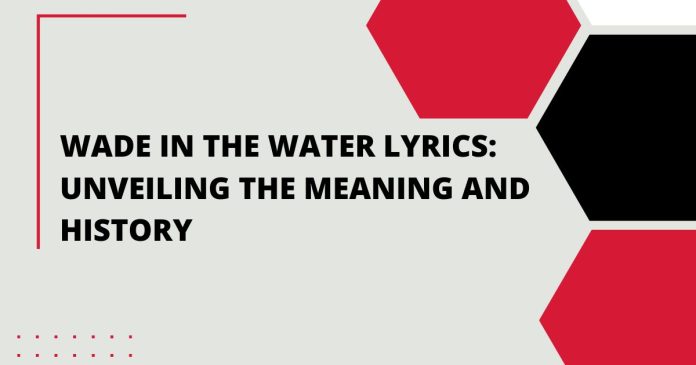Introduction
When it comes to timeless spirituals, “Wade in the Water Lyrics” holds a special place. This article delves into the history, significance, and interpretation of the lyrics, unraveling the profound message hidden within this classic spiritual.
The Origin and Historical Context
Origins of the Spiritual Tradition
The roots of “Wade in the Water” trace back to the era of slavery in the United States. Spirituals were an essential means of communication and solace for enslaved African Americans, providing a channel to express their emotions, hopes, and hidden messages.
The Underground Railroad Connection
One interpretation of the song’s lyrics is that they were used as a signal to escaping slaves. The line “Wade in the water, children” was believed to advise fleeing slaves to enter the water to throw off pursuing hounds. The metaphor of water being a symbol of safety and a path to freedom becomes evident.
Hidden Meanings and Symbolism
The mention of healing in the song might allude to the water’s cleansing and rejuvenating properties. It could also be a spiritual call for emotional and physical healing amidst the harsh circumstances of slavery.
Analyzing the Lyrics
Embracing Spiritual Cleansing
The repeated chorus of “Wade in the water” suggests a cleansing ritual, both physically and spiritually. Water often symbolizes rebirth and renewal in various cultures, making the act of wading a transformative experience.
Crossing to Freedom
“God’s gonna trouble the water” points to divine intervention and protection. The idea of God disturbing the water could signify creating a diversion or confusion to aid escaping slaves, making their path to freedom less detectable.
A Message of Hope
The lyric “See that band all dressed in white” has been interpreted as a vision of angels or divine messengers guiding and guarding the way to freedom. This spiritual reassurance would have provided comfort to those seeking liberty.
The Evolution of “Wade in the Water”
Influence on Music and Culture
Over time, “Wade in the Water” became a cornerstone of African American musical heritage. Its influence can be traced through various genres, including gospel, blues, and even modern adaptations.
Impact on Civil Rights Movements
During the Civil Rights Movement, the song’s themes of liberation and struggle resonated deeply. Its message of resilience and the pursuit of freedom provided a rallying cry for equality and justice.
Contemporary Significance
Relevance in Today’s World
Even today, the lyrics of “Wade in the Water” continue to inspire and uplift. The song’s themes of hope, faith, and overcoming adversity are universal and applicable to various challenges faced by individuals and societies.
Musical Revival and Adaptations
The song’s enduring popularity has led to numerous renditions by modern artists. These adaptations breathe new life into the lyrics, showcasing the timelessness of its message.
Conclusion
“Wade in the Water” lyrics remain a powerful testament to the resilience of the human spirit in the face of adversity. This spiritual’s rich history, hidden meanings, and adaptability demonstrate its enduring relevance across generations.
FAQs
- Q: What is the historical context of “Wade in the Water”? A: The song originated during the era of slavery in the United States and served as a means of communication and solace for enslaved African Americans.
- Q: How was the song used during the Underground Railroad? A: The lyrics were believed to guide escaping slaves to safety by using water as a metaphor for a path to freedom.
- Q: What does “God’s gonna trouble the water” mean? A: It signifies divine intervention and protection, suggesting that God will create obstacles to aid the escaping slaves.
- Q: How did the song impact the Civil Rights Movement? A: The song’s themes of struggle and liberation resonated with the movement, providing inspiration for the pursuit of equality.
- Q: Why is “Wade in the Water” still relevant today? A: The song’s themes of hope, resilience, and overcoming challenges make it applicable to modern-day struggles and inspire individuals worldwide.

